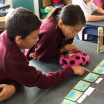Gather information collaboratively to inform practice
Use a team approach to gather information, understand and respond to student needs, and plan and monitor the effectiveness of learning approaches.
On this page:
On this page:
Current page section: Gather information collaboratively
Go to top of current page: Gather information collaboratively
Go to top of current page: Gather information collaboratively
Go to top of current page: Gather information collaboratively
Get the right people around the table
Get the right people around the table
Bring together a team to work in partnership with the student and their whānau.
- Discuss with the student and their whānau who could be part of a supportive team, for example, the speech-language therapist, Learning Support Coordinator, RTLB, support worker, dean.
- Consider asking colleagues who have experience of teaching students with speech, language and communication needs if they would like to contribute.
- Consider connecting to external expertise or agencies with specialist knowledge.
- Build regular times for communication.
Learn about effective practices
Learn about effective practices
The team at Wiri Central School talk about how they investigated effective practices and environments to encourage rich language learning.
Download video transcript.
Source: Ministry of Education Te Tāhuhu o te Mātauranga
Closed Captions
Use circles of evidence
Use circles of evidence

Seek student voice
Seek student voice
Utilise digital collaborative tools
Utilise digital collaborative tools
Support information sharing
Support information sharing
- Encourage parents and caregivers to share what they have noticed or assessments they have had done outside school.
- Build on any programmes or materials used at home, to maximise consistency and support for the learner.
- Develop systems for passing on information about a learner’s needs, progress and next steps.
- Share information about out-of-school programmes that may help boost the learner’s self-esteem, for example, classes or groups for music, art, dance or sports.
Next steps
More suggestions for implementing the strategy “Identify needs and how to provide support”:
-
Current page Gather information collaboratively
Return to the guide “Speech, Language and Communication”

Speech, Language and Communication
How to use this site
Guide to Index of the guide: Speech, Language and Communication
Strategies for action:
-
Identify needs and how to provide supportShow suggestions for Identify needs and how to provide support
- Build whanaungatanga
- Recognise needs and intervene early
- Gather information collaboratively
- Organisations, programmes and resources
-
Key areas to supportShow suggestions for Key areas to support
-
Helpful classroom strategies years 1-8Show suggestions for Helpful classroom strategies years 1-8
-
Helpful classroom strategies years 9-13Show suggestions for Helpful classroom strategies years 9-13
![5185 [google-docs-collaboration.png]](https://inclusive-live-storagestack-assetstorages3bucket-3uty0hejzw6u.s3.ap-southeast-2.amazonaws.com/public/inclusive-education/example-images/google-docs-collaboration__ScaleMaxWidthWzEwODZd.png)
